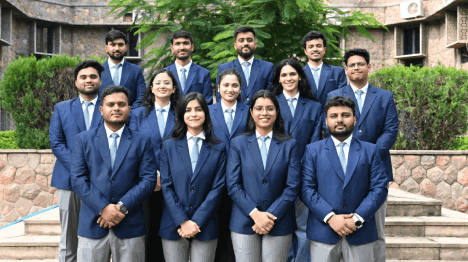- About Us
-
Academics
Schools
Programs
General Information
-
Faculty
The faculty members and researchers working at IIHMR University come from varied backgrounds including, but not limited to medicine, public health, management, economics, statistics, demography, human geography, social and behavioral sciences, rural development and pharmaceuticals.
-
Admissions
- Research
Publications & Journal
- Executive Education
Executive Programmes
- Online Certification Courses
ONLINE CERTIFICATION Courses
- Training
- Placements
- Contact
- Pradanya
- Blog
- Fee Payment
- NAAC
- IQAC
- NIRF
-
About Us
- About IIHMR University
- Board of Management
- Academic Council
- Board of Studies
- Research Board
- Institutional Review Board
- Finance & Audit Committee
- Departmental Research Committee
- Chairperson's Message
- President's Message
- IIHMR University Act
- Infrastructure
- Collaboration
- Ranking
- Board of Studies (School of Digital Health)
- Awards & Accolades
-
Academics
- Institute of Health Management Research
- School of Pharmaceutical Management
- ML Mehta School of Development Studies
- School of Digital Health
- SD Gupta School of Public Health
- MBA (Hospital and Health Management)
- MBA (Pharmaceutical Management)
- MBA (Development Management)
- MBA (Healthcare Analytics)
- Master of Public Health
- Student Manual – Cohort 9 (2021-2023)
- Master of Public Health (Offered by Johns Hopkins Bloomberg School of Public Health, USA in cooperation with IIHMR University, Jaipur, India)
- Ph. D.
- MBA CSR & ESG Management (Executive)
- MBA Sustainable Business Management (Executive)
- Common Information for all the Programs
- Academic Calendar
- Student Handbook 2020-21
- Committees
- Policies
- Annual Exam Calendar
- Library
- Faculty
- Officers of University
- Dean of Institute of Health Management Research
- Dean of School of Pharmaceutical Management
- Dean of School of Development Studies
- Dean of SD Gupta School of Public Health
- Dean of School of Digital Health
- School of Digital Health
- Faculty List A to Z
- Faculty List Designation Wise
- Faculty List School Wise
- Admissions
- Research
- Executive Education
- Training
- Placements
- Alumni
- Events
- Job Openings
- Contact
- Research
End line Evaluation of EnSIGN Project
Agency : CARE, India
Patriarchy is prominent in agricultural settings. Women have limited access and control over household assets. Their participation in agricultural work is poorly recognized. Their knowledge of health is inadequate. They are unlikely to seek healthcare for themselves. Enhancing the Sustainable Farming Initiative through Gender and Nutrition (EnSIGN) was an innovative project implemented by CARE India. It sought to empower women in agricultural households which were part of a corporate supply chain. The project was piloted in Bankura district of West Bengal. It adopted a community based approach to enhance the social recognition of women paid and unpaid work in agricultural settings. Women in the local communities were mobilized into groups. Their knowledge and care seeking behavior regarding health and nutrition (especially iron deficiency anemia) was sought to be improved. Linkages were established with the public health system.
IIHMR University carried out the end line evaluation of EnSIGN project. It had carried out the baseline study of the project as well. Mixed methods were used during both studies. International evaluation criteria were used during the end line evaluation. The end line results were compared with the baseline benchmarks for both quantitative and qualitative indicators. The findings were encouraging. EnSIGN is a robustly relevant project. It contributes to many sustainable development goals. The choice of project site (rural West Bengal) is justifiable since iron deficiency anemia is widely prevalent among women in the reproductive age group in rural West Bengal. The sense of assertion has increased among women project participants. They are more likely to consider themselves as contributing to agricultural production. There is greater knowledge of healthy food. Women were more likely to consume different food groups during the time of end line study. The difference between household dietary diversity score and women’s dietary diversity score had reduced from the level seen during the baseline study. Women project participants were more likely to seek healthcare for themselves during the time of the end line study. EnSIGN project is an example of an effective nutrition sensitive intervention.



